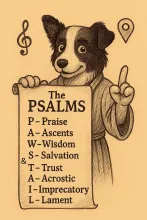🐾
150 songs & prayers teaching God’s people how to talk to God about everything.
📚 What is the Psalter?
- Genre: Israel’s inspired songbook (prayers, hymns, liturgy).
- Structure: Five books with “Amen” doxologies — Book I (1–41) · Book II (42–72) · Book III (73–89) · Book IV (90–106) · Book V (107–150).
- Language/Style: Hebrew poetry (parallel lines, images, acrostics like Ps 119).
👤 Who wrote them?
- David — the largest share (titles attribute ~73).
- Asaph (temple musician) — a dozen.
- Sons of Korah — choir guild (e.g., 42–49; 84–85; 87–88).
- Solomon — 72; 127 (by title).
- Moses — 90 (oldest in the book).
- Heman the Ezrahite — 88; Ethan the Ezrahite — 89.
- Anonymous — roughly one-third carry no author line.
🕰️ When were they written?
- From Moses to the return from exile (~1400–400 BCE by title range).
- United Monarchy: many Davidic psalms (c. 1000 BCE).
- Divided Kingdom & Exile: communal laments and Asaph/Korah pieces.
- Post-exilic: praise and pilgrimage psalms in Book V (e.g., 120–134).
📍 Where do they happen?
- Wilderness & caves: fleeing Saul/Absalom (e.g., 57; 63).
- Jerusalem/Temple: processions, feasts, dedications (e.g., 24; 30; 84; 122).
- Exile by foreign rivers: grief far from home (e.g., 137).
- Everyday life: sickness, enemies, work, kingship, creation, family.
🏷️ Reading the small print (superscriptions)
- “Of David/Asaph…” — author or collection line.
- Occasion notes: “when he fled,” “dedication,” etc. (historical hooks).
- Musical directions: “To the choirmaster,” instruments, tunes, “Selah.”
🎶 The PAWS & TAIL Guide (memorable types of psalms)
Teach it with Zuko’s mnemonic: “PAWS & TAIL.”
- P — Praise/Hymn: celebrate who God is (8; 96–100; 145–150).
- A — Ascents (Pilgrimage): travelers to Jerusalem (120–134).
- W — Wisdom: living the good life under God (1; 37; 49; 73; 112; 127–128; 133).
- S — Salvation/Thanksgiving: “He rescued me!” (18; 30; 34; 40; 107; 116).
- &
- T — Trust: calm confidence (23; 27; 46; 62; 91; 121; 131).
- A — Acrostic/Torah: alphabet or law-love (19; 111–112; 119).
- I — Imprecatory: cry for justice against evil (35; 69; 109; 137).
- L — Lament (individual/community): honest grief and plea (3; 13; 22; 51; 74; 79; 88).
Special sets: Royal/Messianic (2; 72; 110), Zion/Enthronement (46–48; 93–99), Creation (8; 19; 104), Penitential (traditionally 6; 32; 38; 51; 102; 130; 143).
🧭 Quick map: Who/When/Where — sample anchors
- David in the wilderness: 63; 57 — thirst & trust away from sanctuary.
- After David’s sin: 51 — confession; clean heart, new spirit.
- Temple joy: 84; 122 — longing and arrival in Zion.
- National disaster/exile: 74; 79; 137 — communal pain and plea.
- Torah delight: 1; 19; 119 — God’s word as path and light.
🧩 How Hebrew poetry works (30-second tour)
- Parallelism: lines rhyme in thought (synonymous, contrast, step-up).
- Imagery: rock, shepherd, fortress, wing-shadow, lion’s mouth.
- Repetition/chorus: helps memory and congregational use (e.g., 136).
🛠️ How to use the Psalms (simple practice)
- Find your type: Lament when hurting, Trust when anxious, Praise when thankful, Confession when guilty.
- Pray the lines: say them aloud, insert names/situations.
- Watch the turn: most laments move from complaint → request → confidence.
- Return often: the Psalms train your heart over time.
🪔 Starter set to read this week
- Mon: 1 (Wisdom) & 23 (Trust)
- Tue: 51 (Confession) & 32 (Thanksgiving after forgiveness)
- Wed: 13 (Short lament) & 27 (Confidence)
- Thu: 84 (Temple longing) & 122 (Pilgrimage)
- Fri: 96 (Praise) & 103 (God’s compassion)
- Sat: 110 (Royal/Messianic) & 2 (Kingship)
- Sun: 136 (Thanksgiving refrain) or 150 (Final praise)
💬 Bible S O S (Self Discovery)
SAY — What stands out?
Which type matches your season right now — Lament, Trust, Praise, Thanksgiving, Wisdom?
OBEY — How will you pray it?
Choose one psalm; underline the request lines; make them your prayer this week.
SHARE — Who could you encourage?
Send a single verse to someone who needs it (e.g., 34:18; 46:1; 121:5).
📖 Summary Thought
The Psalms are God’s gift to shape our voice — from Aleph to Tav of the heart — so that in every place and season we can speak truthfully to Him.


Comments